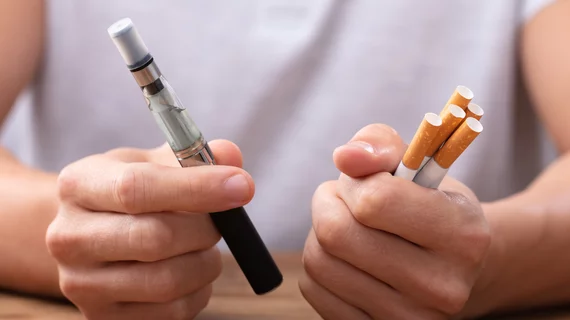Former smokers who vape now still need to be screened for lung cancer. Many of them aren't
Former smokers who quit using traditional cigarettes and opt instead for electronic cigarettes are less likely to undergo recommended lung cancer screening.
Despite kicking their initial habit, these individuals remain at risk of developing lung cancer due to their history of smoking, current use of e-cigarettes, or both, experts cautioned this week in JAMA Network Open.
“E-cigarettes have been increasingly used as tobacco cessation aids,” Qian Wang, MD, MPH, from Case Western Reserve University in Cleveland, and colleagues noted. “However, there are concerns about the potential long-term cancer risks associated with e-cigarette use.”
The United States Preventive Services Task Force (USPSTF) recommended low-dose CT lung cancer screening (LCS) for former and current smokers in 2013. In 2021, the task force updated those recommendations to increase screening eligibility to a larger swath of people. Despite these recommendations and their documented effectiveness in helping to catch lung cancer in its earliest stages, uptake remains low.
This is especially true for current and former e-cigarette users, according to the results of this latest analysis.
Researchers included more than 20,000 LCS eligible individuals in their study. Of those, 26.7% had undergone LCS at least once, while 14.6% were up to date on their screening.
The group found that use of e-cigarettes—both former and current—was associated with 21% lower odds of ever having completed LCS. Of the individuals who had undergone screening at some point, current use of e-cigarettes in lieu of combustible cigarettes was linked to 46% lower odds of being up to date on recommended cancer screenings.
“Emerging research suggests that e-cigarettes contain definite and probable carcinogens and cause similar cancer-associated gene deregulations as combustible tobacco,” the group cautioned. “However, it has been shown that two-thirds of individuals currently using e-cigarettes consider e-cigarettes to be less harmful than combustible cigarettes.”
One reason for the lower screening uptake observed among e-cigarette users could be that they are less aware of LCS eligibility in general; efforts to warn consumers of the products’ potential harms have not been nearly as widespread as those seen regarding combustible cigarettes, the authors noted.
The group suggested that more work needs to be done to educate users on the potential harms and to clear up misconceptions that e-cigarette use negates the need for LCS.
The study abstract is available here.

